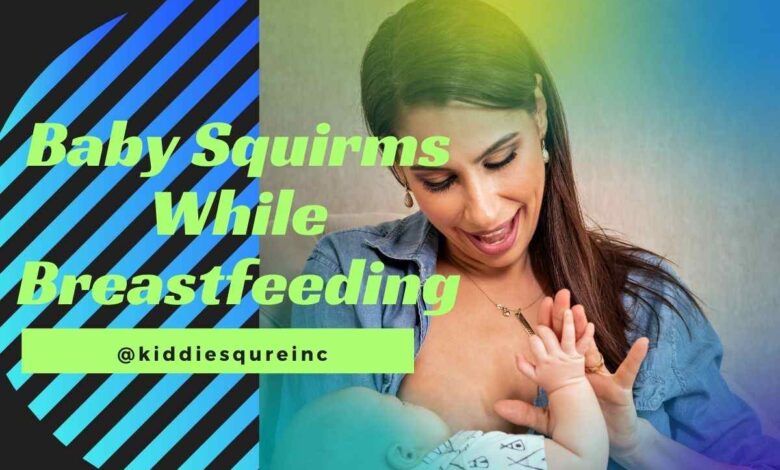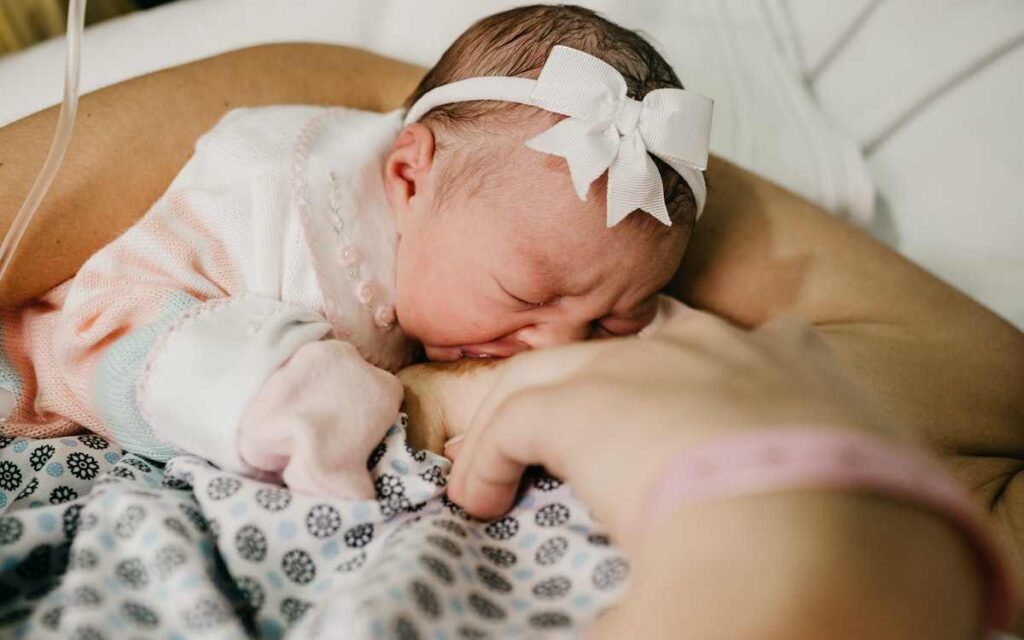Baby Squirms While Breastfeeding

There are several reasons why baby squirms while breastfeeding. These babies may even wriggle, fuss, or pull off the breast during breastfeeding.
Sometimes the reasons are not far-fetched, but at times you may find it difficult to figure out what is wrong.
It is often common to see this type of behavior as your baby grows or moves into a new developmental stage.
Therefore, parents need to understand why the baby squirms while breastfeeding and know what to do when the baby is frantic while breastfeeding.
Note; Always inform your pediatrician whenever the baby shows a sign that is strange to her normal routine.
Now let’s take a look at why your baby is so squirmy while nursing?
Table of Contents
Baby Squirms While Breastfeeding – It Is Normal?
As a new mom, you may observe your child’s squirmy. In some cases, this behavior is normal.
Also, a child’s behavior depends on his age and phase of development. A child’s squirmy behavior can be observed at any time, but it is mostly seen in 6 to 8 weeks old.
Sometimes the reasons are not far-fetched, but at times you may find it difficult to figure out what is wrong.
Baby squirms as they come in contact with their new environment, observing their surroundings and being able to notice the world. During this stage, squirming help babies to start gaining more control over their body.
The growth spurts phase can also be a factor in why your baby squirms while breastfeeding. The growth spurts stage is the first 7-10 days of a baby’s life and can continue up to nine months.
During this time, your baby breastfeeds more than usual or more often. This phase is temporary.
When a child is sick, you will notice her fussy behavior during nursing. Teething babies can also be squirmy while nursing.
baby Squirms While Breastfeeding – Why do Baby Squirms and Grunts While Breastfeeding?

As mentioned, baby squirming while breastfeeding is a normal occurrence among infants. However, there are few times, the infant squirms violently due to frustration.
The Following are the reasons why the baby squirms and grunts while breastfeeding.
Please note that the problem may also manifest due to a combination of two or more factors.
1. Positioning and Attachment
Positioning is one good factor that causes the Baby to squirm while breastfeeding. During nursing, an infant needs to be put in a comfortable position to ease nervousness during breastfeeding.
Good positioning ensures that the baby latches on properly and lets down breastmilk efficiently.
This avail your baby the benefits of breastfeeding – keep baby healthy and happy.
When a baby is uncomfortable, you see them squirming, wriggling, and twisting, they are trying to find a better position to feed comfortably.
ALSO READ: How to Help Baby Gain Weight While Breastfeeding
2. Preference for a Particular Flow Speed
Faster flow speed or heavier letdown may be the reason your baby squirms while breastfeeding.
At the early phase of breastfeeding, the rate at which a child shallows breastmilk differs as it grows rhythmically and deeper with time.
When the breastmilk flows too fast, the child may feel overwhelmed as she may experience coughing and gagging during nursing.
As every individual has differences in size between any two same organs. The same thing applied to the breast, one can be larger than the other, or one can have a faster flow rate than the other.
This may lead to a child preferring to suck from one breast over the other. This can lead to baby squirming during breastfeeding when place on a disfavor breast.
3. The Child May be Tired
Tiredness can make the baby squirms while breastfeeding. Children behave differently when they’re tired.
Some want to get breastfed and go off to sleep when they are tired, while some want to nap and breastfeed later.
When you obverse your baby is rubbing at her face, stretching wriggling, and fussy during breastfeeding. Your baby is telling you she wants to sleep not feed.
4. Health Issue
When a baby is faced with health challenges, it may wriggle and get frantic while breastfeeding.
Pain makes a baby grow uncomfortable. Whether is a sore in the ear and any part of the body or Fever, this makes the baby feed less.
Most times your baby returns to her feeding routine once the pain vanishes.
Infection in the mother’s breast can also affect her baby’s intake. An infection changes the taste or texture of the milk causing baby to grunt and squirms while breastfeeding.
Whenever, you noticed that your baby is in pain, discern where the pain is by examining him or consulting a Pediatrician.
5. Teething in Babies
Teething can inflame the gums of your baby. The pain in the gums will cause the child to squirm and affect her nursing.
To help a child cope with this – give her something cold, or rub a frozen damp cloth on her gums or give her 2 drops of vanilla extract to ease the pain before breastfeeding.
6. Growth Spurts
When babies go through a new stage of development, it affects every aspect of their daily routine including feeding.
An increase in body size and weight or contact with their new environment, observing their surroundings, and being able to notice the world can make baby squirms while breastfeeding.
7. The “Low Spirited” Phase
As an adult there are days we have a low vibe or low spirited, the same thing also occurs in nursing babies.
To display their frame of mind, babies pull away and cry while breastfeeding. It becomes difficult to handle them. Parents must be diligent when handling their child during this phase until it passes.
Why is My Baby so squirmy while Nursing: What to do When Baby Squirms
Have Sleep Routine
You need to help your baby observe a good sleep routine. Baby needs 12-16 hours of sleep every day, anything other than that they will be tired and fussy during breastfeeding.
Parents should ensure that the baby has an early naptime and a good amount of sleep during the day. Parents need to give special attention to their baby’s sleep routine because babies can’t handle their tired and hungry bodies.
Skin to Skin
Skin-to-skin contact is very important at this early stage of a baby’s life.
To make a child feel comfortable in your lap, they need some level of a parental bond. The skin-to-skin contact of the mother and child helps facilities the process.
To work this out, parents should have close contact with their baby before feeding and between two feeding sessions to calm and relaxed the baby.
Try Pumping
When a child is having difficulty latching to the mother’s breasts, or she is impatient with the slow let down of breastmilk, it makes the baby squirms while breastfeeding.
To solve this problem, the mother has to pump/express breastmilk for her child. This method allows your baby to feed properly and get the required nutrients.
Feeding Position
A wrong holding position might be the reason your child is squirming while breastfeeding. The solution is for you to change position or shift around to a different posture. Also, check your baby’s diaper to make sure they are not wet and he isn’t sweating.
Avoid Early Bottles Use
A baby requires less effort with a bottle than breastfeeding. Because the child has to put in more work to initiate a heavy letdown from the mother’s breast.
But, with a baby bottle, there is a steady flow of milk through the nipples. Therefore, when a child is used to bottles at an early stage, it becomes problematic for her to breastfeed.
Use Pacifier
At times, after breastfeeding, your child may simply need to suck on the nipple. But, if the letdown proceeds consistently, it will upset the infant since that is not what he needs and this is where parents can use pacifiers.
ALSO READ: Does Supplementing With Formula Reduce The Benefits Of Breastfeeding
Burp Between Feed
It is a general impression that the child should burp only after they are done feeding. But, burping at regular intervals is a better option.
Why do you burp a child?
During latching on the mother’s breast, the baby swallows air alongside the breastmilk. This excess air lowers her appetite as the tummy is filled with air. Taking breaks and burping at regular intervals help ease the process of feeding.
Consult a Doctor
If your child’s squirmy behavior is a result of ill health. See a pediatrician to do a thorough checkup on your child.
Infection in the mother’s breast can also affect her baby’s intake. An infection changes the taste or texture of the milk causing baby to grunt and squirms while breastfeeding.
Whenever, you noticed that your baby is in pain, discern where the pain is and consulting a Pediatrician.
Q&A: Why Does My Baby Pull Away and Cry While Breastfeeding?
Once in a while babies pull away and cry while breastfeeding because the letdown is heavy and the milk is flowing too fast. When this happens you may find that your child pulls away not long after starting to feed. Your baby is fussy because she can’t catch her breath as she has to swallow faster and faster.
When you observed this behavior, allow her a moment to pause and rest before returning her to the breast. This could help.
Another reason why the baby pulls away and cry while breastfeeding is when they need to burp. A faster flow of milk can cause this. They become fussy when swallowing more air or swallow down milk quicker when hungry. When you observed these signs, stop breastfeeding and burp your baby to relax.
Q&A: Why do Baby kicks while breastfeeding?
Breastfeeding babies has a lot of personalities and one of them is the Gymnast. A Gymnast is the most physical of all breastfeeding child characters – Read here.
They kick their legs as you start finding them. Infants’ legs are shockingly firm; you can get hurt when they kick you in the chest during breastfeeding.
Holding their legs still is an effective move to curtail their movement. You can also use a toddler tuck – this works by wedging the child’s legs between your arm and body while the infant is in the support hold.
Infants can kick when they feel their legs are hanging. Endeavor to snare his leg over your arm to give him a sense of safety.
Bottom Line
I believe this article has helped answer why do baby squirms while breastfeeding, why is Baby so squirmy While Nursing? and, why do baby squirms and grunts while breastfeeding?
We have also shown you what to do when you observed these signs. These tips will assist you with dealing with your baby’s squirms and fuss. While directing her to a more joyful and healthier feeding process.
Like this article? I would be happy if you share or pin it for some other time. You can also stay in touch and follow us on Facebook and Pinterest.







